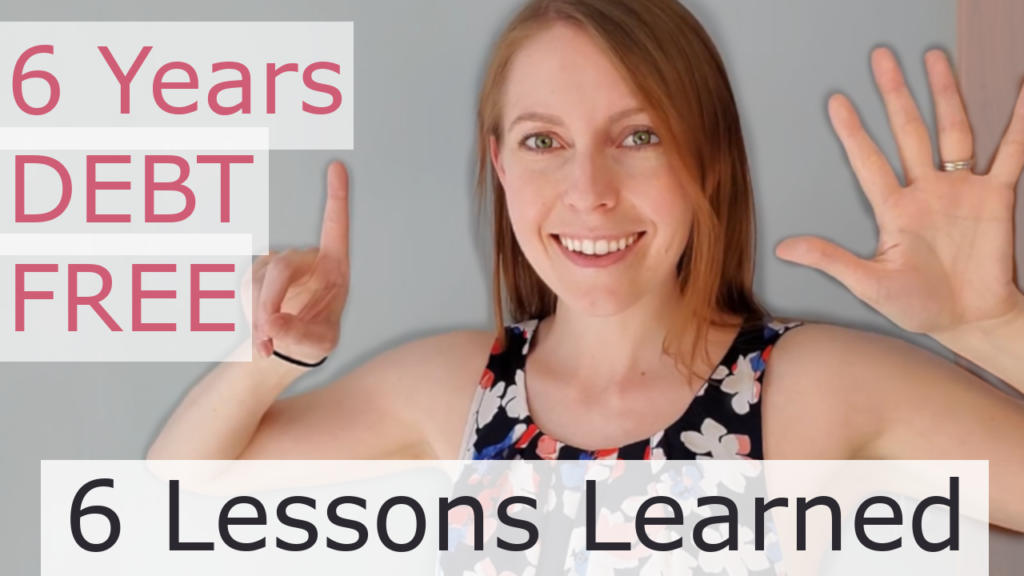At the start of July we celebrated our debt free anniversary!!! On 7/1/2014 I paid off the last of my student loans. For the last 6 years we have been completely debt free. We bought our house in cash so we have no mortgage and no rent. We have 3 paid for vehicles, no student loans, no personal loans, no credit card debt, we owe no man…or woman.
We paid off the $49,000 of debt that we graduated school with over the course of 5 years. It is crazy to think that we have now been debt free for longer than we were paying off debt.
Today I wanted to share 6 lessons I’ve learned in our 6 years of debt freedom because I know many people have lived with debt their entire adult life and have a hard time picturing what their life would be like if they were free of it.
Paying off debt can be a slow and painful process. Debt is so normalized in our society, it can feel impossible to get rid of. I hope this post inspires you to keep working on paying off debt even though it is a difficult journey. What are you most excited to do when you become debt free?
It is emotional for me to be debt free. When I was little, I remember holding a pillow against the floor vent in my room to block the sound of my parents fighting downstairs about debt. I remember thinking that the only thing worse than no money is negative money. I didn’t want to live a life where I was so scared and angry about money all the time. It’s really difficult to explain what a huge relief it is for me to be free of that stress.
Disclaimers: Becoming high income earners
During these six years our incomes have continued to grow. Neither of us make six figures but we do both make above average salaries (well I did before I quit to work on FinanceRox).
What makes our household different is that we have 2 above average salaries and no child costs (DINK life). Admittedly, it is difficult to parse out the benefits and lessons learned from being debt free from the benefits and lessons learned from having an above average income since both contribute to being able to save a lot of money. I did try to narrow this post down to just debt-related lessons. I do believe that these six years of being completely debt free have taught us a lot.
6 Lessons Learned From 6 Years of Debt Freedom
LESSON #1 Habits we adopted to pay off debt are the same habits required to build wealth.
Your habits will follow you from debt-pay off to wealth building. Habits are often deeply ingrained and hard to change. That is a good thing if the habit is a desirable one.
For example, the other day I ate a bagel and cream cheese in a parking lot while I was running errands. Preparing snacks for running errands means I don’t have to stop for more expensive fast food. This is one example of hundreds of frugal habits we have that add up to big savings that can go towards either debt or investing.

Here are a few habits that helped us pay off debt that now help us build wealth:
#1 Tracking spending.
Knowing where money goes is the keystone habit for saving money. Without tracking, it is difficult to know where you can attack and improve. We frequently analyze how much we are spending compared to statistics and professional recommendations. Are we spending 10% of income on food? 20% on transportation? This is how we discovered that our food spending had gotten out of control.
Not saying that it is good to be average, in America, the average is quite consumeristic. But it is helpful to know which areas are opportunities for improvement.
#2 Constant improvement (kaizen).
I never hit a point where I thought “ok that’s frugal enough, if I keep this up the debt will be paid off by X/XX/XX”. We still read articles about how to manage money and how to save more. We still focus on growing our incomes by self-education, formal education and certification. Money is just like every other area of life, I care about it and want to always improve. I care about security and want to be great at managing money. I enjoy learning about money.
The habit of constant improvement helped us pay off debt and now we apply this same habit to wealth building. There is always more we can cut and there is always more we can make. It’s a journey of becoming more efficient with money, not a destination.
#3 Financial discipline.
Prioritizing the things you want to purchase is a skill that has to be honed. It takes discipline to take the time to prioritize and it takes discipline to say “No” to the unimportant. For the last 6 years we have still had to prioritize our “wants” (there seems to be an unending stream of them) and still have to sort out which “wants” are important to us and which are mere impulses.
I don’t think of discipline as being synonymous with punishment or pain. I think of it as being synonymous with our freedom to choose what is actually important to us. Discipline to say no gives you the opportunity to say yes.
I’ve also found that the discipline required to say “No” that I built when paying off debt helps control emotions with investing. We buy and sell single stocks for fun and profit. It is emotionally difficult to keep a stock when the price dips. Having good emotional discipline will help you buy and hold which is one of the best strategies for growing your investments.
LESSON #2 Debt free=Better marriage and relationships
A TD Ameritrade study found that 41% of divorced Gen Xers and 29% of Boomers say they ended their marriage due to disagreements about money. It is well known that stress about money is hard on relationships and I think debt causes the most strife. While Mr. FinanceRox and I have had a handful of money arguments (mostly because of my scarcity mindset and anxiety around money), even back in the day we had relatively few disagreements about money. Really the only two I can remember were trivial, things like how much to spend on a new computer and where we would spend limited vacation dollars.
Without debt, decisions are easier and the stakes are lower. We don’t have to spend mental energy thinking what we will do if we can’t afford to make a payment. We can both have ample spending money and not feel deprived. We both experience very little money stress and less stress means that we are each more pleasant to be around. Across the board, not having debt makes our marriage easier and happier.
If you are paying off debt aggressively, you may find yourself giving some tough “No”s to friends and family members. Having debt paid off means I am much more easy going when we are planning activities and am able to say “Yes” more and treat them more often. My plan was always this: Say “No” to the small stuff now so that I can give big “Yes”es in the future. Now I give them.
LESSON #3 The power of low monthly expenses
The average american homeowner pays $2,151 per month in payments on debt.
Here’s the breakdown:
$1029 Mortgage payment
$365 Auto loan
$351 Student loans
$250 Personal loans
$156 Credit card minimum payment
We can do whatever we want with that $2,151. This makes it possible to give more, save more and cash flow emergencies and other unexpected expenses.
It means we don’t need to tap into emergency funds for $2000 surprise dental bills since I’m a bonehead who thought I didn’t need to go to the dentist for 7 years because I had never had a cavity before. Instead of raiding our savings, we can just take the excess income from that month and pay it.
Most of this money we just save and invest. Without debt, we are able to save around 50-60% of our income each month. Our record savings rate was a 3 pay period month in 2019 where we hit a savings rate of 71% of our pretax income (translates to 87% of our post-tax income). It blows my mind to think about how we only spent 13% of the money we received that month. The flexibility that low monthly expenses allows us is huge.
#4 We are happy spending $40,000 per year, so why spend more?
I had assumed that our spending would increase a lot when the debt was gone, but it didn’t increase that much. Since becoming debt free, I’ve realized that we had really been fostering contentment at a lower spending level.
I’m a big believer that we all need to be finding happiness AND saving money. If you can, then when the debt is gone, that excess money can be saved and invested, which is key to building real wealth.
I’m not saying we will never increase our lifestyle. But I’m confident that we are happy at $40,000 so we have no plans of increasing our spending at this point. Once money is abundant, other factors come up that naturally keep spending in check.
For example:
–We would like to spend more at restaurants but we don’t want to dine out more because we are trying to eat healthier.
–We would like to spend more on entertainment but barely have time to enjoy the books, games, and streaming services that we already have.
–We would like to spend more on travel but we will already be essentially maxing out available travel days that Mr. FinanceRox has available at work.
–We like buying “stuff” but we already have more “stuff” in our house than I can reasonably keep cleaned and organized (in fact, I would like to be more minimalist and have a house with less clutter).
Find ways to be happy at whatever spending level that you are at. Don’t tie your level of happiness to the amount of money you make. Don’t delay finding happiness because you assume that after debt payoff you will suddenly have it. They are two different things. Plenty of people are happy spending less than the $60,600 per year average. Plenty of people are spending $100,000 per year and are miserable. While I do believe the two are loosely correlated (I’ve experienced unhappiness as a result of not having enough money), I’d challenge you to find utter happiness and joy at a lower spending point than you currently spend.
#5 The wealthier we become, the less we care about appearances
Having experienced huge amounts of shame from being broke, I understand what it is like to want to hide money struggles. I’ve always cared too much about what other people think. I do want to look like a regular person. I don’t want to stand out by looking shabbier than average.
However, my confidence has grown greatly over the last 6 years. Simultaneously, my disdain for our hollow flashy culture has also grown. This is not meant to throw shade on anyone. It is not meant to shame or judge anyone who enjoys spending money on appearances. It is simply an observation that I made that over time I care less and less about spending money on makeup, nails, hair dye, fancy cars, clothes, purses, coats, shoes, jewelry, and etc…
-I buy most of my clothes second hand from garage sales and thrift shops and I’m not ashamed of it anymore.
-My purse is a $5 fanny pack from Walmart.
-My car is only worth about $1400 according to KBB.
-We could have used our $210,000 as a down-payment on a flashy, beautiful million dollar house but instead decided to buy a nice $210,000 home.
Having money in the bank gives the confidence that replaces the desire to appear wealthy. I have stopped trying to figure out how to embroider a Nike Swoosh on plain shirts.

#6 Debt freedom=freedom
Ultimately, being debt free has given us so much more freedom in our lives. Mental freedom from not having to stress so much and make hard decisions about how to spend limited resources as well as more choice freedom for how we want to live.
Here are just a few of the things we have been able to do since becoming debt free:
-I was able to spend more than a month in Colorado with my Dad after his heart surgery.
-Dramatically increased the amount of money we give to charities.
-We are able to spend $7,000 every year on vacations (just discovered that the average American homeowner spends $7000 per year on interest expense alone. For the breakdown check out THIS article.
-I was even able to quit my job to work on FinanceRox full time.
Full Financial Freedom
Being able to save and invest aggressively means that we are making huge progress every year towards Financial Independence/Retiring Early (F.I.R.E.). The ultimate goal here is to have enough money invested that we could live off of the returns. We both find our work fulfilling and don’t plan to quit working but do look forward to the day when work is 100% optional.
In summary
If your goal is to become debt free, go for it. It might seem like an impossible goal but go for it anyway. You will surprise yourself along the way. Some things will be more difficult than you expect, some things will be easier than you expect. Every sacrifice I made to become debt free was worth it, I don’t regret anything. It’s similar to working out. It’s not easy, but when I make the effort, I am always glad that I did it.
FOR DISCUSSION:
What are you most excited to do when you become debt free?
Did any of these lessons surprise you?

